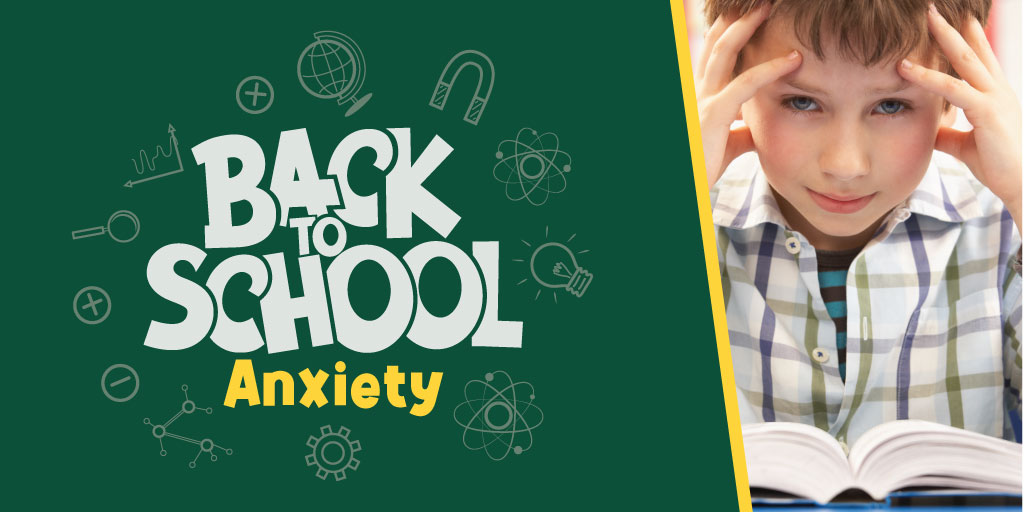The back-to-school blues is a period of time that every parent understands. As much as you love your kids, their going back to school can give you a much-needed break!
Holidays tend to give children more freedom, later bedtimes, and less rigid routines. So the return to school can be a real shock to the system. But as parents, it’s a huge de-stressor if you don’t have to deal with the tantrums and bad temper every time term starts.
As the weather gets cooler and the nights get longer, you need to know that your child’s mental health is taken care of. So we’ve gathered some of the key signs to look out for to avoid (or respond) to those back-to-school blues.
Are they showing signs of tiredness?
First things first, are they getting to bed on time? Transitioning to an early bedtime can be a big part of your issue if they’re feeling tired all the time. If they’re showing signs that they aren’t sleeping, it’s time to get tough on bedtimes!
Tiredness can be a general symptom that they aren’t sleeping when they go to bed. Worries and anxiety about school could be keeping them up, whether it’s starting PE for the first time or having trouble with fractions. Striking up a conversation to find out if there’s anything bothering them could really help them feel more confident in themselves.
Electronics tend to be a sleep thief too! Make sure you limit the amount of time they are on devices to at least two hours before bed. If they’re finding it difficult to sleep, this is the perfect time to get them playing a sport or being physically active. Not only is it great for sleep, but they’re learning a new skill or developing a new passion! It’s a win-win!
Are they reluctant to try new things or speak up in class or at home?
Kids are picky. Just one tiny change in food or the expression on your face could lead to a lifelong issue with tomatoes. Or spinach. Or Broccoli. (You can tell we’ve done this before, right?)
It becomes a serious problem when it’s disrupting their school life. Maybe they’re hiding in their rooms or not volunteering answers in class. Class interaction is an essential milestone for enhancing their learning experience, and it’s just as important that they feel heard at home.
Reluctance to get involved can often be because the activities they’re doing are so new. Whether it’s a new year, class, subject, or even new responsibilities, being apprehensive is natural. Reassure them that trying new things can often be scary and to jump in and get wet! Talk to their teachers if their behaviour becomes disruptive to see if there are steps you can take to make this transition easier.
Have they lost interest in spending time with their friends or doing activities they enjoy?
When we do things we enjoy, it boosts our mood. If your child is less inclined to enjoy time with friends (and even family) or play their favourite sport, it’s a sign. Intervention is necessary!
A disinclination to get involved could be a result of a fallout with their peers or classmates. Have a frank conversation to find out the extent of the problem and, if necessary, speak to their teacher if you need a mediator.
Whether it’s netball or football (plus much, much more!), being active is important for physical and mental cognition. Have a chat with them about it and remind them of the positives. Remind them about the times they won a medal or learnt a new skill they were struggling with. If it’s still not right, it might be time for something new.
Have they stopped socialising at school?
Socialising with their peers seems like a distraction from learning, right? But socialising for a child is a learning curb just like any other subject. Learning to understand others, their culture, their interests and solving conflicts are all part of growing up. School is one of the only environments most children have in common, so it’s vital that it’s a place for all types of skills.
If they’re withdrawing from socialising, it could become incredibly disruptive. Loneliness and isolation can result in irritable or angry behaviour. If you find yourself in a similar cycle around the end of the holidays, it’s time for a new tact. Consider organising play dates with your child’s friends during the holidays or getting them involved in an activity camp like Kids Takeover or Ballers Academy. Increasing their activity level can increase confidence and even provide them with new things to discuss and friends.
Are they acting out in class or crying often?
Bouts of anger and crying could be a sign that they are having trouble adjusting to being in school again. Remember socialising is important, but if it starts to make them anxious, acting out could lead to in-school punishments. Punishments will ultimately worsen their behaviour and reduce their comfort levels at school.
Keeping up a steady routine even when they’re not at school could make the transition less problematic as they get older. Getting up earlier, doing chores and engaging in some activity-based childcare during the holidays can help reduce that transition anxiety.
In the case of serious issues such as bullying or problems with one of the subjects, physical activity can be a great help too. Getting active is a great way to increase your cognitive capacity and can help them practice anything from listening to instructions to counting. Make sure you go to their teachers if you do suspect them of being bullied.
If you’re looking for the best in active childcare, why not come to us? Ballers Academyis the home of skills and drills for your budding footballers. And look no further than Kids Takeover for all your sports and activity needs.



